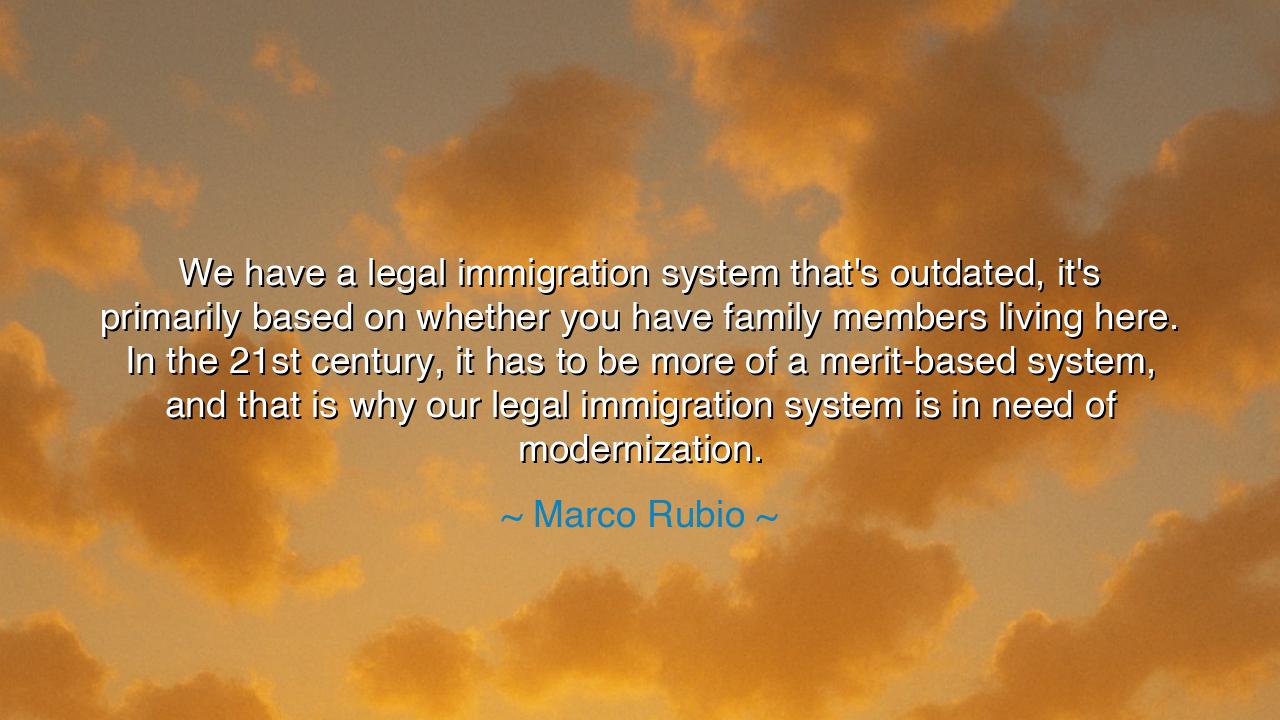
We have a legal immigration system that's outdated, it's
We have a legal immigration system that's outdated, it's primarily based on whether you have family members living here. In the 21st century, it has to be more of a merit-based system, and that is why our legal immigration system is in need of modernization.






The words of Marco Rubio strike at the heart of a challenge that has shaped nations across time: “We have a legal immigration system that’s outdated, it’s primarily based on whether you have family members living here. In the 21st century, it has to be more of a merit-based system, and that is why our legal immigration system is in need of modernization.” This is not merely a statement about laws and borders—it is a meditation on how societies are built, how they renew themselves, and how they choose the balance between heritage and merit, between the bonds of kinship and the strength of individual contribution.
In ancient days, empires too were confronted with this same dilemma. Rome, the mightiest of them all, rose not only on the swords of legions but on its power to absorb the stranger. Yet Rome often granted citizenship through bloodlines and inheritance, while neglecting at times the skills and virtues of those who could strengthen the Republic. And when Rome began to stumble, it was not merely because of the strength of its enemies, but because it failed to modernize, to see that new ages require new structures. The lesson is clear: a society that clings to yesterday’s methods cannot fully meet tomorrow’s challenges.
Rubio’s words reveal the tension of the present age. A system based solely on family ties carries with it compassion and loyalty, for it binds kin together and honors the human need for belonging. Yet if this is the only measure, it risks overlooking the builders, the thinkers, the healers, the innovators whose gifts might strengthen the foundation of the nation. To thrive in the 21st century, he argues, a nation must not only welcome those bound by family, but also those whose talent and merit can elevate the whole.
We see echoes of this wisdom in the story of America’s own beginnings. The waves of immigrants who arrived on its shores carried not just names of kin, but also crafts, skills, and ideas. The German farmers who tilled the soil, the Irish laborers who built the rails, the Chinese workers who carved through mountains for the great railroads—all brought merit, sweat, and genius. Yet for every era of inclusion, there were also moments when the gates of opportunity were closed too narrowly, leaving behind voices that might have enriched the nation’s song.
But Rubio also warns that no system, however noble, can remain frozen in time. Modernization is the call of history. Just as ships gave way to trains, and trains to airplanes, so too must laws evolve to reflect the currents of the age. The needs of the 21st century—innovation, technology, global competition—demand that societies look not only backward to heritage, but forward to capacity, to the potential each newcomer brings to the table of the future.
Yet wisdom tells us this: balance is the path of harmony. For a society that forgets family ties grows cold and mechanical, but a society that neglects merit grows stagnant and frail. Thus, the teaching of this quote is not to abandon compassion for kinship, but to enlarge the circle—to craft a system that honors both the bonds of blood and the gifts of ability, so that the nation is both humane and strong.
The lesson for us all, then, is twofold. On the one hand, we must demand of our leaders systems that are not relics of the past but tools for the present and future. On the other hand, in our own lives, we must also learn to value people not only for where they come from, but for what they bring, the virtues they embody, and the contributions they offer. To modernize is not to discard tradition, but to refine it so that it serves the living rather than the dead.
So, children of tomorrow, remember this teaching: laws are not eternal—they are instruments of justice that must be tuned to the music of the age. Outdated systems become burdens, but systems shaped by wisdom and courage become bridges to greatness. Let us, then, honor both family and merit, tradition and innovation, and in doing so, build a society worthy of its past and prepared for its future.






AAdministratorAdministrator
Welcome, honored guests. Please leave a comment, we will respond soon